|
|
|
Sort Order |
|
|
|
Items / Page
|
|
|
|
|
|
|
| Srl | Item |
| 1 |
ID:
095540
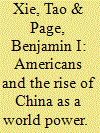

|
|
|
|
|
| Publication |
2010.
|
| Summary/Abstract |
The rapid ascendency of China has attracted considerable attention from American scholars, policymakers, and media. Yet what does the American public think about the rise of China as a world power? In this paper we use survey data collected by the Chicago Council on Global Affairs and other organizations to explore the nature and causes of Americans' views. It turns out that most Americans are well aware of the rise of China. Some are apprehensive about that rise, chiefly for national security (rather than economic) reasons, and many favor a degree of off-shore 'balancing' of the sort that realists recommend. But few Americans want to actively work to limit the rise of China. Very few favor the use of troops to defend Taiwan. Very few favor a nuclear-armed Japan. Large majorities of Americans take stands more akin to those of neo-liberals than realist theorists, favoring cooperation and peaceful engagement with China.
|
|
|
|
|
|
|
|
|
|
|
|
|
|
|
|
| 2 |
ID:
095544
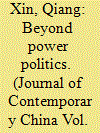

|
|
|
|
|
| Publication |
2010.
|
| Summary/Abstract |
Facing the ever-growing interdependence across the Taiwan Strait, Mainland China's strategy towards Taiwan is undergoing a profound change, that is, transcending the staunch realpolitik mentality and turning to an institutional arrangement in policy making. Especially since President Hu Jintao took up his position, the Mainland has endeavored to improve cross-Strait relations through the institutionalization of a series of sensitive issues, such as the proposals and signatures of some long-term accords aiming to advocate economic cooperation, promote social exchanges, weaken political opposition and foster mutual trust. By taking the Mainland's national development strategy shift, Taiwan's domestic reality and 'institution deficit' in cross-Strait relations into consideration, this paper analyzes the reasons, efforts and features of the Mainland's recent institutional-orientated policy transition.
|
|
|
|
|
|
|
|
|
|
|
|
|
|
|
|
| 3 |
ID:
095536
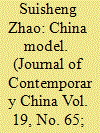

|
|
|
|
|
| Publication |
2010.
|
| Summary/Abstract |
China's economic success under an authoritarian political system in the past 30 years has raised a question about whether the China model will replace the Western model of modernization. This paper seeks answers to this question by exploring to what extent China offers a distinctive model of economic and political development and whether the China model represents a successful co-existence of a free market and an authoritarian state in order to maintain economic growth and political stability, as well as discussing what the appeals and limitations of the China model are.
|
|
|
|
|
|
|
|
|
|
|
|
|
|
|
|
| 4 |
ID:
095537
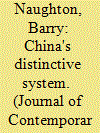

|
|
|
|
|
| Publication |
2010.
|
| Summary/Abstract |
The idea of the 'Beijing Consensus' does not accurately describe what has happened in China, nor does it represent a consensus among Chinese economists and policy-makers. This article presents six distinctive features of China's economic development, and argues that while each provides important lessons, none are easily copied by other developing countries. The intertwining of state and market in China is at the root of China's most distinctive developmental features. However, the specific character of the Chinese system and the way in which government and business relations have been structured cannot be readily replicated in other countries.
|
|
|
|
|
|
|
|
|
|
|
|
|
|
|
|
| 5 |
ID:
095548
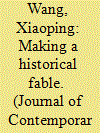

|
|
|
|
|
| Publication |
2010.
|
| Summary/Abstract |
The screening of the film Lust, Caution in China in late 2007 and the subsequent banning of its actress in early 2008 created a great stir, arousing heated debates across many ranks of society. The debates lasted for more than half a year, making it one of the most sensational cultural (and political) events in China of the year. As a result, the intricate texture of its cinematic text and the complex reactions of the social context constitute an intriguing case of sophisticated cultural politics with rich and significant import. Through an analysis of the film's narrative strategy, this paper reveals the film's nature as a political film noir aimed to allegorize the history of modern China. A discussion of its diversified reception in the Chinese world, rather than echoing the mainstream opinion that sees the harsh critique from the Chinese populace as merely a blind reaction of rampant nationalist sentiment, discloses the heterogeneous voices among differing social forces competing for cultural hegemony in contemporary China.
|
|
|
|
|
|
|
|
|
|
|
|
|
|
|
|
| 6 |
ID:
095538
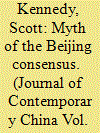

|
|
|
|
|
| Publication |
2010.
|
| Summary/Abstract |
The widely touted concept of the 'Beijing Consensus' (BC) suggests that China's economic success violates conventional theories of development and offers developing countries an alternative vision to the Washington Consensus (WC). Although ambitious, the original conception of the BC is not up to the task of being a worthwhile competitor to the alternative model from which its name was coined, not because of the WC's apparent worthiness, but rather because the BC is a misguided and inaccurate summary of China's actual reform experience. It not only gets the empirical facts wrong about China, it also disregards the similarities and differences China's experience shares with other countries, and it distorts China's place in international politics. In spite of these weaknesses, the BC is nevertheless a useful touchstone to consider the evolution of developmental paradigms, compare China's experience with that of others, identify the most distinctive features of China's experience, and evaluate its significance for the development prospects of other countries and for international relations.
|
|
|
|
|
|
|
|
|
|
|
|
|
|
|
|
| 7 |
ID:
095546
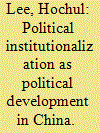

|
|
|
|
|
| Publication |
2010.
|
| Summary/Abstract |
Contrary to many doubts, the institutionalization of political leadership survived the succession process in China between 2002 and 2003. In 2004, Jiang Zemin attempted to override the institutionalized political leadership but was unsuccessful. These episodes demonstrate the level of political institutionalization that has been steadily undertaken since the reform and opening of China. After theoretically defining institutionalization as the first significant stage of political development, this article examines the current progress in political institutionalization at two distinct levels: external and internal. This article argues that the Chinese Communist Party (CCP) leadership intended to establish political stability directly and facilitate economic development indirectly under the goal of sustaining the political legitimacy of the CCP's rule of China. Finally, this article examines whether China would follow the ideal sequence of political development, i.e. institutionalization leading to participation leading to contestation. Though China has achieved considerable political institutionalization and conducted many experiments of expanding political participation, public contestation is still confined solely to within the party. Thus, it remains to be seen whether or not China will follow the ideal sequence.
|
|
|
|
|
|
|
|
|
|
|
|
|
|
|
|
| 8 |
ID:
095545


|
|
|
|
|
| Publication |
2010.
|
| Summary/Abstract |
Since economic reforms began in 1979, China has sought to overcome the technology gap by absorbing foreign advanced technology through FDI. This paper investigates the impact of FDI via exports on the innovation performance of domestic firms in China's high-tech product industries for the period 1995-2006. By using the panel data analysis, we confirm the hypotheses that: (1) exports of domestic firms have positive spillover effects on innovation performance of local firms either through learning or through competition; (2) R&D activities of foreign-invested enterprises in the host country in an industry are positively associated with innovation performance of domestic firms in that industry; and (3) import of technology, which is important to the establishment of assimilative capability, has positive effects on domestic innovation performance. This provides evidence suggesting that China's domestic firms benefit from spillovers associated with FDI and from export activity of both domestic firms and foreign-invested enterprises.
|
|
|
|
|
|
|
|
|
|
|
|
|
|
|
|
| 9 |
ID:
095542


|
|
|
|
|
| Publication |
2010.
|
| Summary/Abstract |
China has become part of the global trend of solidarity and networking among grassroots non-governmental organisations across national borders. This paper examines the social and political implications for Chinese green civil society from the activities in the country by international environmental NGOs. Following a historical, statistical and geographical profile of transnational civil society's penetration in China, it investigates closely the material and ideational benefits received by Chinese activist organisations from transnational collaboration, against the complex and often nebulous interactions between Chinese NGOs, their global partners and the government authorities. The paper argues that transnational civil society's presence and achievements in China have helped legitimise and strengthen the burgeoning civil society in the country, and this is meaningful beyond the environmental field.
|
|
|
|
|
|
|
|
|
|
|
|
|
|
|
|
|
|
|
|
|